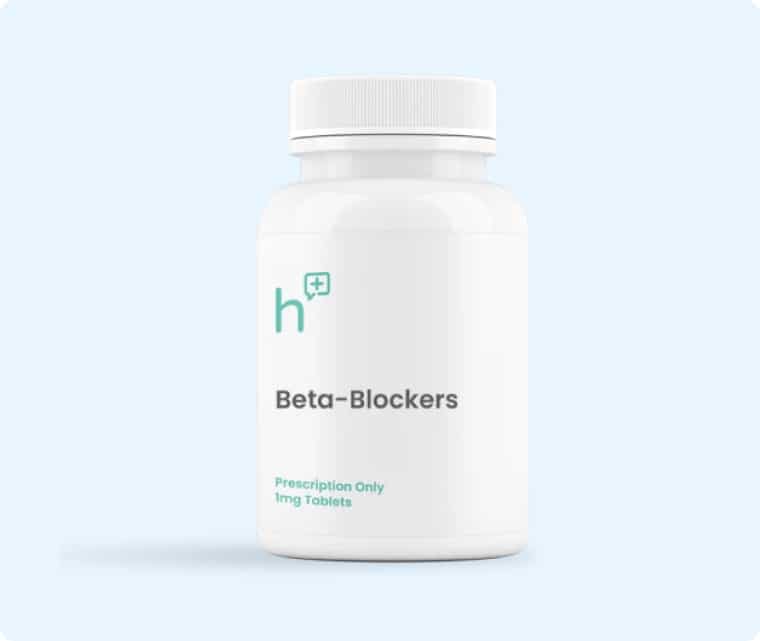

Create an account, provide basic information, and schedule your online consultation with a licensed holistic health doctor.

Use our secure telemedicine video platform to discuss your health concerns from the comfort of your home.

After your consultation, your doctor will create a personalized treatment plan based on your needs.







Beta blockers can help manage physical symptoms of anxiety in specific situations. Prescription options like propranolol address rapid heartbeat, trembling, and sweating. Knowing what beta blockers are used for can help determine if they fit your needs.

Beta blockers may help manage anxiety-related physical symptoms during stress tests. They can contribute to more accurate test results by regulating heart rate and blood pressure. Healthcare providers often recommend them for patients with significant pre-test anxiety.

Beta blockers can help with social anxiety by reducing physical symptoms like shaking hands, a racing heart, or sweating. These medications allow individuals to feel more composed in social settings. But they don’t directly address emotional anxiety.

Beta blockers are often used for performance anxiety, such as public speaking. They help control physical symptoms like a rapid heartbeat. It also helps individuals focus better on their presentation or performance without distraction from physical stress responses.
Propranolol (Inderal) is a prescribed beta blocker for managing anxiety-related symptoms. It can address the physical effects of anxiety, such as a racing heart or trembling. It’s also well-studied for performance-related situations.
Beta Blockers for Anxiety
Propranolol (Inderal):
Other Beta Blockers:
Beta blockers reduce the effects of adrenaline and other stress hormones on the body by preventing them from binding to beta receptors in the heart and blood vessels. This mechanism helps regulate physical responses like heart rate and blood pressure.
When used for anxiety, beta blockers may reduce symptoms such as rapid heartbeat, trembling, and sweating.
While beta blockers are prescribed for different medical conditions, their ability to manage physical stress responses makes them useful for situational anxiety. But they do not address the emotional aspects of anxiety, focusing instead on the physical symptoms.


Dosage and Administration
The appropriate propranolol dosage depends on individual needs and specific situations. Healthcare providers determine the correct beta-blocker dose for anxiety after evaluating your medical history and circumstances.
Never adjust your propranolol dose on your own. Overdosing can be dangerous. Always follow your healthcare provider’s prescription based on:
Anxiety triggers:
Only a qualified healthcare provider can determine the proper dose for your needs.
Common side effects include fatigue, dizziness, and cold hands or feet. Some people may experience mild sleep disturbances or digestive discomfort when starting treatment. Weight gain is a potential long-term side effect, though not everyone experiences it.
Inderal side effects are usually mild and often improve as your body adapts to the medication. Contact your healthcare provider immediately if you experience severe dizziness, a very slow heartbeat, mood changes, or shortness of breath.
Never stop taking beta blockers suddenly without consulting your healthcare provider, as this can lead to adverse effects. Discuss any concerns about side effects with your provider, who can adjust your treatment plan as needed.
Contraindications
Several factors influence whether beta blockers suit your needs. Conditions needing careful consideration include asthma, breathing issues, heart problems, low blood pressure, diabetes, and depression. Inform your healthcare provider about any of these before starting treatment.
Beta Blockers and Alchohol
Beta blockers and alcohol may interact, so discuss your drinking habits with your provider. They can advise if you need to adjust alcohol consumption while on this medication.
Beta Blockers and Other Medications
Blood pressure medications, antidepressants, heart treatments, and even over-the-counter pain relievers can interact with beta blockers. Always provide a complete list of medications and supplements to your provider.
Your healthcare provider will assess if beta blockers are safe and appropriate for your situation. This overview highlights common considerations but is not an exhaustive list of contraindications.

Beta blockers are medications that block the effects of adrenaline on the heart and blood vessels. They also help lower heart rate and blood pressure.
Beta blockers treat high blood pressure, heart conditions, migraines, and anxiety-related physical symptoms like rapid heartbeat, sweating, and trembling.
Depends on the individual. Consult your healthcare provider for the dose needed.
Propranolol effects typically last 4–6 hours, depending on the dose and individual response.
Propranolol can start working within 30–60 minutes for anxiety symptoms.
Take Propranolol 30–60 minutes before a stressful event, as directed by your healthcare provider.
Beta blockers usually begin reducing anxiety-related physical symptoms within an hour of taking a dose.
Yes, beta blockers may help manage the physical symptoms of anxiety, such as rapid heartbeat, trembling, and sweating.
Beta blockers can help reduce physical stress responses, like increased heart rate, but they don’t directly address emotional stress.
